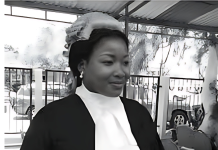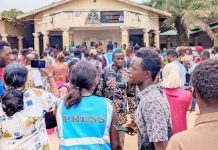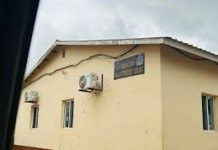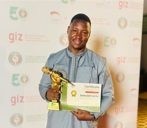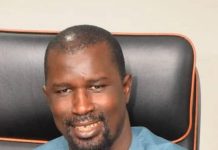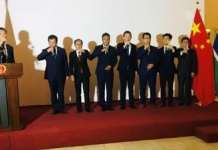By Kebba AF Touray
Sankulleh Janko, a Gambian journalist with West Africa Democracy Radio (WADR) has emerged as the Radio Reporter of the Year at the maiden edition of the ECOWAS Prize of Excellence Awards for Journalists.
The historic ceremony, held in Banjul on Friday, 25th July 2025, was organized as part of ECOWAS’ 50th anniversary celebration and brought together top regional officials, government dignitaries, and some of West Africa’s finest journalists to celebrate excellence in the media.
Janko’s award-winning story centered on the 2022 floods that devastated parts of The Gambia. Torrential rains caused widespread destruction in various communities, displacing families and destroying homes. His reporting focused on the relief support provided by ECOWAS to the affected victims in the North Bank Region (NBR), Kanifing Municipality (KMC), and West Coast Region (WCR). The story was commended for its powerful human interest angle, empathetic narration, and detailed examination of how regional assistance impacted local lives.
“The story was the 2022 floods after the Gambia experienced torrential rains causing havoc in many communities. The story looked at the relief support provided by ECOWAS to the flood victims especially in NBR, KMC and WCR. For me it’s was so touching witnessing the testimonies of these flood victims. Listening to the victims narrating how ECOWAS relief support assisted them in their time of needs was motivating enough for me,” Janko said.
The story stood out among more than 200 entries submitted from 12 ECOWAS member states. A seven-member jury composed of seasoned media experts assessed the submissions based on criteria such as originality, relevance, storytelling, and regional impact. Janko’s work captured the emotional weight of a national tragedy and connected it to a broader regional response.
“Sincerely I feel great, the feeling was incredible,” Janko said in reaction to the win. “Professionally it’s another feather in my cap and personally it’s great. Perhaps I’ll tell my grandchildren that I’m the first winner of this maiden ECOWAS awards.”
The awards were held in the presence of prominent personalities including the ECOWAS Resident Representative in The Gambia, H.E. Miatta Lily French, who described the awards as a strategic move to strengthen the regional body’s engagement with the media. “These awards are not just about recognition, but about promoting regional solidarity, peace, and development,” she said in her welcome address. She explained that the submissions captured the essence of West Africa’s integration journey, and the quality of work presented showed that journalists are key partners in development.
Representing the President of the ECOWAS Commission, Dr. Omar Alieu Touray, Hon. Abdou Kolley, Director of Cabinet, used the platform to highlight the importance of journalism in West Africa’s democratic journey. “Journalists are not just chroniclers of events. They are agents of accountability, defenders of democracy, and catalysts for social change,” he remarked.
The President of the Gambia Press Union (GPU), Mrs. Isatou Keita, also spoke at the event, describing the night as “a powerful moment for journalism in West Africa.” She emphasized the need to continue advocating for the safety and protection of journalists across the subregion. “This award is not just recognition, it’s an affirmation of journalism’s critical role in democracy and development,” she stated.
Alongside Janko, eleven other journalists from different ECOWAS countries were honored. Nigerian media veteran Paul Ejime won the Print Journalism Award. A Nigerian journalist also took home the Online Journalism prize, while a Beninese reporter emerged victorious in the Television Category. All winners were hailed for their outstanding contributions to journalism in the region.
Speaking on the broader state of journalism in The Gambia, Janko was candid about both progress and persistent hurdles. “The state of journalism I would say is encouraging in the Gambia. Yes journalists are still faced with numerous challenges including legal issues, harassment, the salary is nothing to write home about etc. But in honesty, we have a more free press than we had under the previous regime. But this is only true if the draconian laws are amended.”
He also pointed to the growing problem of limited access to information and safety concerns. “Access to information I would say is one of the biggest challenges. But on a broader angle, safety and insecure pose numerous challenges to journalists in a our region.”
Janko believes Gambian journalists have a critical role to play in amplifying ECOWAS-led initiatives and in telling more regionally connected stories. “Gambian journalists can play a number roles really. ECOWAS has launched and implemented so many projects in the Gambia. Let’s make research on these projects from both The Gambia and regional perspective. Take for instance ECOWAS aims to play a pivotal role in efforts to bridge Banjul and Barra. All these are things journalists could explore,” he explained.
He offered practical advice to journalists aiming to pursue similar work. “Well it’s first if all important to acquaint yourself with the topic you want to work on where. Once you have those information, you make your research and approach the matter with utmost professionalism.”
Janko expressed strong support for the ECOWAS award initiative. “It’s very important for institutions like ECOWAS to recognise our work because it will serve as a motivation and encouragement. It’s obvious we do this work for the public interest but it feels right for relevant stakeholders like ECOWAS to recognise what we do,” he said.
Though now based in Dakar and facing a busy schedule, Janko remains focused on doing what he loves. “For me it’s not really about where I’m seeing my career going. Don’t get me wrong we all want to get to certain levels. But for me, I just want to continue doing what I love, working,” he said. “I’ve relocated to Dakar and there is a lot of work on my desk but I’m looking at different things.”
His message to young and aspiring journalists is simple yet powerful: “My advice would be for young people to be determined and stay focus. It’s not rocket science, be passionate about what you do and it will reflect in your work.”








